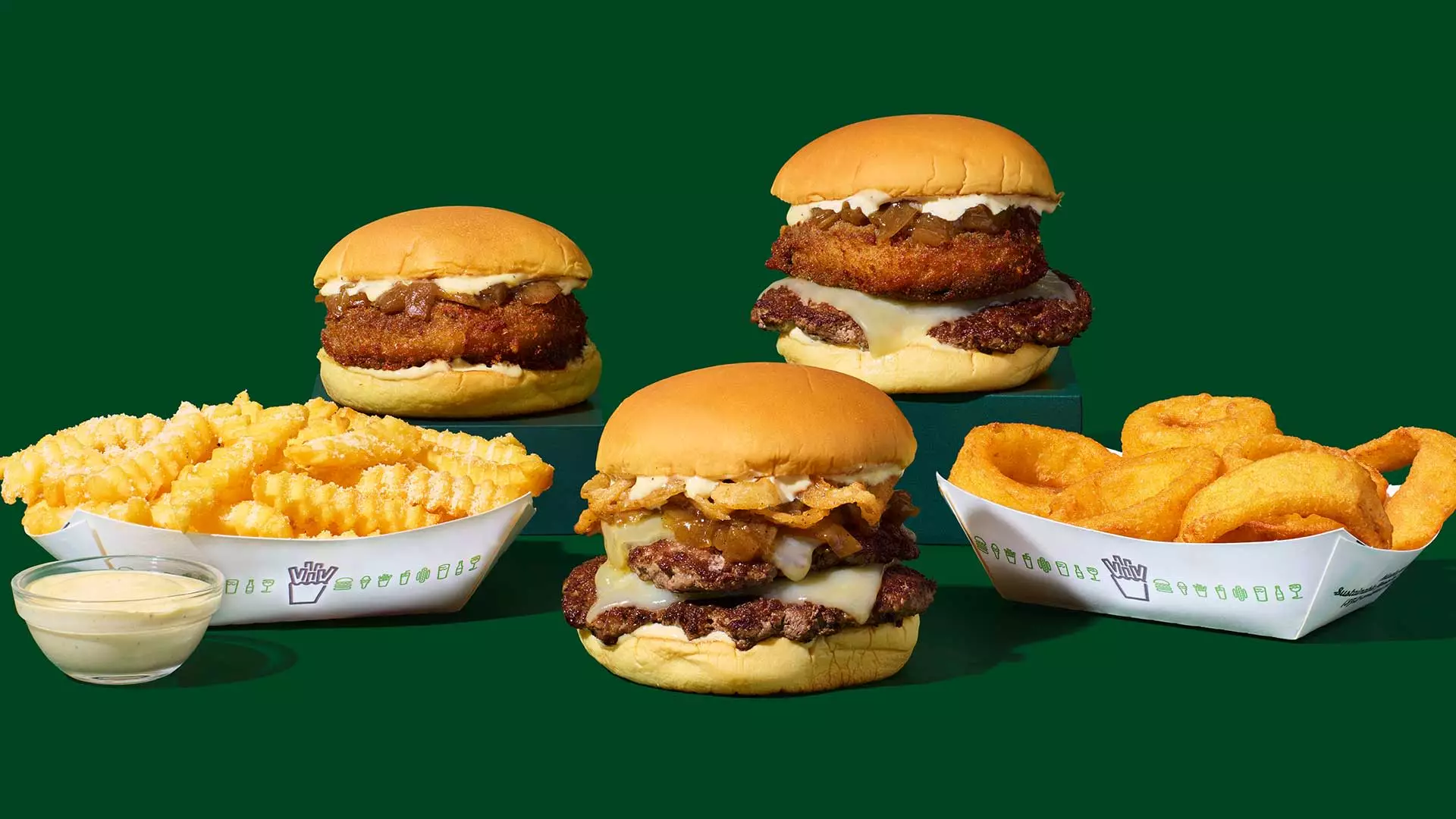In a landscape saturated with fast-food chains desperate to differentiate themselves, Shake Shack’s latest strategy to position itself as a purveyor of “fine dining” at a fraction of the price reeks of illusion. The company’s earnest declaration that its premium items, like the $10.99 French Onion Menu, are “incredible value” betrays a fundamental misunderstanding of what consumers truly seek. While the chain touts its ability to offer gourmet-inspired dishes at lower prices, this marketing narrative glosses over the realities of its underlying business model: commodifying luxury for mass appeal. Such practices risk diluting the very essence of quality, embedding a false sense of affordability in products that are, in truth, premium in cost but not necessarily in experience.
Shake Shack’s recent success with the Dubai Chocolate Pistachio Shake, priced at an unprecedented $10, exemplifies this paradox. The product’s rapid sell-out might simply be a testament to hype and novelty rather than genuine consumer affinity for value. This raises an important question: Is Shake Shack genuine in its intention to democratize fine dining, or is it merely capitalizing on fleeting trends to inflate its margins? The danger lies in consumers perceiving these overpriced menu items as accessible, when in reality, they echo a culture of exclusivity designed to allure the well-heeled. This strategy, while profitable in the short term, risks alienating core loyalists who crave authenticity over artifice.
The Illusion of Culinary Innovation as a Brand Strategy
By continually rolling out limited-time offerings like the French Onion Soup Burger, Shake Shack seems to lean heavily on the allure of culinary novelty, yet this approach often masks a lack of genuine innovation. The burger, featuring high-end ingredients such as Gruyère cheese and Parmesan aioli, resembles a gourmet experience in appearance but remains a commodity that can be replicated across countless other fast casual venues. The inclusion of fried onion rings and specialty fries—marketed as “first-ever”—are merely superficial perks. These embellishments are intended to create an aura of exclusivity, but ultimately, they reinforce the idea that consumers must pay a premium simply for the appearance of sophistication.
This tactic reveals a critical flaw: the emphasis on packaging over substance. True culinary innovation requires consistency, soul, and a commitment to quality, not just pretzel buns and flamboyant toppings. Shake Shack’s focus on gimmicks and limited-time offerings risk turning “premium” into a marketing buzzword, diluting its brand identity and fostering skepticism among discerning diners. It’s a classic case of posturing rather than genuine craftsmanship—an insincere attempt to elevate fast food into something more refined when, in essence, it remains a calculated marketing ploy designed to boost short-term revenues.
The Economic Myopia and Consumer Manipulation
Rob Lynch’s assertions about “democratizing fine dining” and providing “incredible value” are emblematic of a broader reckless optimism that disregards economic realities. While the company claims it’s offering “food and culinary experiences” that normally sell for $25 elsewhere, the truth is that this narrative conveniently ignores the quality and authenticity that truly underpin fine dining. Dining out is a cultural experience rooted in craftsmanship, ambiance, and genuine ingredients—not merely a matter of high-priced components slapped onto a fast-food framework.
Most troubling is the strategic choice to avoid raising prices on the core menu by instead layering on limited-time premium offerings. This approach essentially cross-subsidizes gourmet indulgences while maintaining the façade of affordability, but it ultimately exploits consumer perceptions. Patrons are subtly encouraged to accept inflated prices in the name of “value,” a tactic that fosters cognitive dissonance rather than trust. It’s a version of economic trickery that risks normalizing price inflation under the guise of innovation, fostering an environment where consumers are led to believe that they are consumers of “luxury” at bargain prices.
Additionally, despite the company’s efforts to manage rising beef costs through productivity gains, inflationary pressures remain a looming threat. The willingness to push premium items even amid macroeconomic and consumer uncertainty suggests a shortsighted focus on short-term profits rather than sustainable brand integrity. Shake Shack’s strategy of leveraging trendy, limited-time offerings to maintain growth signifies more of a marketing gamble than a commitment to genuine culinary excellence.
A Critical Perspective on the Future of Fast Food & Consumer Trust
In the end, Shake Shack’s pursuit of “value” through inflated prices and superficial luxury serves as a cautionary tale about the deceptive veneer of modern branding. The company’s efforts to merge fast food with fine dining aesthetics might attract a fleeting surge of interest, yet it fundamentally undermines consumer trust. True value in food endures beyond fleeting gimmicks; it resides in authenticity, consistency, and respect for craftsmanship. As the chain continues to chase trends and chase high-margin limited-time offerings, it risks sacrificing these core principles in favor of short-term gains.
The danger of this approach is not only to consumer perception but also to the integrity of the broader fast-food industry. When obesity of prices becomes synonymous with “luxury,” it undercuts the very concept of accessible, honest food. Healthy, reasonably priced options could be marginalized in favor of ostentatious displays that appeal more to aspiration than to genuine dining experience. This cultural shift, if left unchallenged, risks turning everyday meals into symbols of social status, eroding the democratization of good food into a hollow marketing ploy.
It is crucial for consumers and industry voices alike to critically evaluate what “value” really means. Genuine progress in the food industry depends not on scaling gimmicks but on fostering transparency, affordability, and respect for culinary traditions. Shake Shack’s current trajectory, driven by an obsession with premium pricing and trend-driven offerings, may yield short-term profits but threatens the long-term trust and authenticity that form the backbone of responsible culinary innovation.

